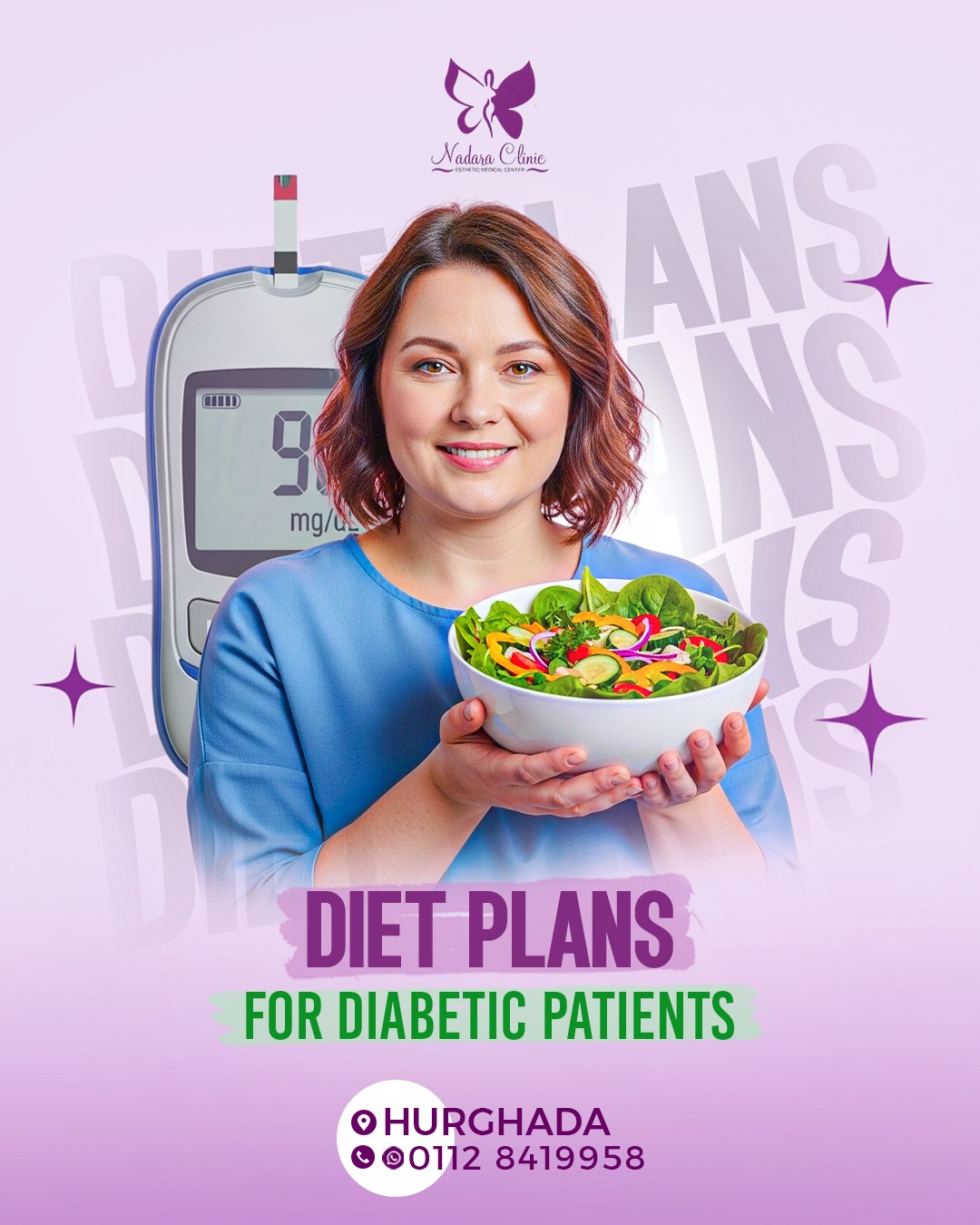Providing diets for diabetics is an important part of a healthy lifestyle.
This, along with being active, can help maintain blood glucose levels.
That is why the clinical nutrition doctors at Nadhara Dermatology, Cosmetic and Laser Center in Hurghada are always interested in providing medical advice for diabetics.
What are the diets for diabetics?
You may worry that having diabetes means not eating the foods you enjoy, but the good news is that you can still eat your favorite foods.
You just need to eat smaller portions or enjoy them more often, as your diet can play a major role in preventing diabetes complications such as heart disease.
So our Clinical Nutritionists will help you create your own meal plan that meets your needs.
food groups:
- Vegetables
They are a good source of several minerals and vitamins (especially vitamin C), which act as a powerful antioxidant and also have anti-inflammatory properties.
They include:
- Broccoli, carrots, peppers, and tomatoes.
- Potatoes, corn, and green peas.
- fruits
They include:
- Oranges, melons, berries, apples, bananas, grapes, and strawberries.
(Strawberries are high in polyphenols, which are beneficial plant compounds that have antioxidant properties, and improve allergic reactions. Insulin in adults)
- acne
They are as follows:
- Wheat, rice, oats, cornmeal, barley,quinoa;
- Bread, pasta, and tortillas.
At least half of the grains you eat per day should be whole grains.
- Protein
- Lean meat.
- fish.
- eggs.
(Eggs may reduce inflammation, improve insulin sensitivity, increase levels of good cholesterol, and change the size and shape of bad cholesterol.)
- Nuts and peanuts (most nuts contain low-carb fiber).
- chia seeds
- Dried beans and chickpeas.
- Meat substitutes such as: tofu.
- Dairy products (fat-free or low-fat)
- Lactose-free milk if you are lactose intolerant.
- Yogurt.
- the cheese.
Diet tips for diabetics
There are many diets for diabetics, but the following tips should be followed:
- Eat foods with heart-healthy fats that mainly come from these foods:
- Oils that are liquid at room temperature, such as canola oil, sesame oil, and olive oil.
(Olive oil contains oleic acid, a type of monounsaturated fat that lowers triglyceride levels after a meal.)
- Seeds.
(Especially flaxseeds, which are high in healthy omega-3 fats, beneficial plant compounds, and some fiber.)
(Flax seeds also lower blood pressure, which is good for heart and gut health.)
- Heart-healthy fish like salmon, tuna, and mackerel are high in omega-3 fatty acids.
(Research suggests that people who eat fish regularly are less likely to develop acute coronary syndromes such as heart attacks, and it helps regulate blood sugar.)
- avocado
(It has less than 1 gram of sugar, few carbohydrates, high fiber content, and healthy fats.)
(Avocado consumption is also associated with improved overall diabetic diet quality, and significant reductions in body weight and BMI.)
- Also use oils when cooking food in place of butter, cream, or margarine.
- You can drink water instead of sweetened beverages, and use a sugar substitute in coffee and tea.
You can also read : Diet for pressure patients.
What are the foods and drinks that diabetics cannot eat?
Some foods and drinks should be limited in diabetic patients, including the following:
- Fried foods and other foods that are high in saturated fats and trans fats.
- Foods that are high in salt.
- Desserts: such as candy, and ice cream.
- Beverages with added sugars including: juices, sodas, and energy drinks.
When should diabetics eat?
Some patients need to eat around the same time each day, and others can be more flexible with time, depending on diabetes medications or the type of insulin.
You can eat the same amount of carbohydrates, and if you take insulin at mealtime, your eating schedule can be a little different.
If you use certain diabetes medications or insulin and skip or delay a meal, your blood glucose level can drop too low.
Consult the doctors of therapeutic nutrition at the Freshness Center for Dermatology, Cosmetic and Laser in Hurghada about when to eat, and whether you should eat it before or after physical activity.
What is the appropriate amount of food for diabetics?
The amount of food that diabetics need varies from one patient to another according to the doctor's instructions, the patient's health condition, as well as the level of glucose in the blood.
So, the Clinical Nutrition Doctors at Freshness Center will help you know how much to eat, and how many calories you should eat each day.
What is the relationship between diabetes diets and weight loss?
If you are overweight or obese, you should develop a plan with the help of your doctor to lose weight.
You can design calorie and physical activity plans to reach and maintain your target weight.
You need to eat fewer calories, and replace less healthy foods with foods that are lower in calories and fat.
Losing weight helps maintain blood glucose, as well as cholesterol, which prevents or delays problems associated with diabetes.
Eating Greek yogurt may help you lose weight, because it contains high levels of calcium, protein and a special type of fat called CLA (conjugated linoleic acid).
If you are planning to become pregnant and have diabetes or are overweight, you should lose your excess weight before pregnancy.
You can also read : Obesity diet.
Do supplements and vitamins help treat diabetes?
There is no clear evidence that taking nutritional supplements, such as vitamins, minerals, or even herbs, helps treat diabetes.
You can only take supplements if you cannot get enough vitamins and minerals from foods.
You should speak with a clinical nutritionist before taking any of these supplements, as some of them may cause side effects or affect you.
Why should I exercise if I have diabetes?
Physical activity is an important part of managing your blood glucose level and staying healthy. The benefits of exercise include:
- Reduce blood sugar levels.
- lowers blood pressure;
- Improved blood flow.
- You burn extra calories so you can keep your weight down.
- It may help you sleep better.
In conclusion, determining the diets of diabetics is important to keep them from any complications that may be related to the type of foods they eat.
You, dear diabetic patient, can follow up with the therapeutic nutrition doctors at the Nadhara Dermatology, Cosmetic and Laser Center in Hurghada to check on your health and receive the appropriate treatment for your condition.


 Book now
Book now



